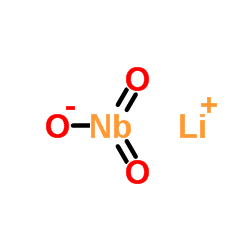铌酸锂, 99.9% metals basis,Lithium niobate
产品编号:西域试剂-WR364798| CAS NO:12031-63-9| MDL NO:MFCD00011080| 分子式:LiNbO3| 分子量:147.85
本网站销售的所有产品仅用于工业应用或者科学研究等非医疗目的,不可用于人类或动物的临床诊断或者治疗,非药用,非食用,
| 英文名称 | Lithium niobate |
|---|---|
| CAS编号 | 12031-63-9 |
| 产品熔点 | 1275°C |
| 产品密度 | 4,659 g/cm3 |
| 精确质量 | 147.907150 |
| PSA | 57.20000 |
| 外观性状 | 白色粉末 |
| 折射率 | 2.3055 (457 nm 160℃) |
| 稳定性 | 常温常压下稳定 避免光,明火,高温。铌酸锂是一种铁电晶体,居里点1210℃,自发极化强度50×10-6C/cm2。经过畸化处理的铌酸锂晶体具有压电、铁电、光电、非线性光学、热电等多性能的材料,同时具有光折变效应。 莫氏硬度5;折射率n0=2.297;ne=2.208(λ=600nm);介电常数ε11s=44,ε33s=29.5,ε11T=84,ε33T=30;居里点1210℃;自发极化强度50×10-6C/cm2。为铁电晶体,经畸化处理的铌酸锂晶体是具有压电、铁电、光电、热电、非线性光学以及光折变效应的多功能材料。 这种盐以及Na和K盐在光电设备、音响设备和激光设备中有很广泛的应用。 |
| 储存条件 | 常温密闭,阴凉通风干燥处 |
相关文档
化学品安全说明书(MSDS)
下载MSDS质检证书(COA)
相关产品
| 安全声明 (欧洲) | S22-S24/25 |
|---|---|
| 危险品运输编码 | NONH for all modes of transport |
| RTECS号 | QT9800000 |
|
Section 1: Product Identification Chemical Name:Lithium niobate (99.998%-Nb)PURATREM CAS Registry Number:12031-63-9 Formula:LiNbO3 EINECS Number:234-755-4 Chemical Family:inorganic compound Synonym:Lithium niobium oxide, Niobium lithium oxide.
Section 2: Composition and Information on Ingredients IngredientCAS NumberPercentACGIH (TWA)OSHA (PEL) Title Compound12031-63-9100%no datano data Section 3: Hazards Identification Lithium is toxic to the central nervous system and on repeated ingestion may damage kidneys and act as a Emergency Overview: teratogen Primary Routes of Exposure:Contact with skin and eyes. Dust inhalation. Eye Contact:May cause slight to mild irritation of the eyes. Skin Contact:May cause slight to mild irritation of the skin. Inhalation:May be irritating to the nose, mucous membranes and respiratory tract. Ingestion:Ingestion may lead to dizziness, abdominal cramps, vomiting, bloody diarrhea, weakness, and convulsions. Acute Health Affects:Lithium is toxic to the central nervous system. May be irritating to skin, eyes and respiratory tract. Chronic Health Affects:May cause kidney damage. May be a teratogen. NTP:No IARC:No OSHA:No SECTION 4: First Aid Measures Immediately flush the eyes with copious amounts of water for at least 10-15 minutes. A victim may need Eye Exposure: assistance in keeping their eye lids open. Get immediate medical attention. Wash the affected area with water. Remove contaminated clothes if necessary. Seek medical assistance if Skin Exposure: irritation persists. Remove the victim to fresh air. Closely monitor the victim for signs of respiratory problems, such as difficulty Inhalation: in breathing, coughing, wheezing, or pain. In such cases seek immediate medical assistance. Seek medical attention immediately. Keep the victim calm. Give the victim water (only if conscious). Induce Ingestion: vomiting only if directed by medical personnel. SECTION 5: Fire Fighting Measures Flash Point:not applicable Autoignition Temperature:none Explosion Limits:none Extinguishing Medium:none required If involved in a fire, fire fighters should be equipped with a NIOSH approved positive pressure self-contained Special Fire Fighting Procedures: breathing apparatus and full protective clothing. Hazardous Combustion andNone Decomposion Products: Unusual Fire or Explosion Hazards: No unusual fire or explosion hazards. SECTION 6: Accidental Release Measures Spill and Leak Procedures:Small spills can be mixed with powdered sodium carbonate or ground limestone and swept up. SECTION 7: Handling and Storage Handling and Storage:Store material in a tightly sealed bottle away from moisture. SECTION 8: Exposure Controls and Personal Protection Eye Protection:Always wear approved safety glasses when handling a chemical substance in the laboratory. Skin Protection:Wear appropriate chemical resistant gloves and protective clothing. Ventilation:If possible, handle the material in an efficient fume hood. In the absence of adequate ventilation a respirator should be worn. The use of a respiratory requires a Respirator: Respirator Protection Program to be in compliance with 29 CFR 1910.134. Ventilation:If possible, handle the material in an efficient fume hood. Additional Protection:No additional protection required. SECTION 9: Physical and Chemical Properties Color and Form:white pwdr. Molecular Weight:147.85 Melting Point:no data Boiling Point:no data Vapor Pressure:no data Specific Gravity:no data Odor:none Solubility in Water:insoluble SECTION 10: Stability and Reactivity Stability:air and moisture stable Hazardous Polymerization:no hazardous polymerization Conditions to Avoid:none Incompatibility:none Decomposition Products:none SECTION 11: Toxicological Information RTECS Data:Oral (rat); LD: >8 gm/kg. Carcinogenic Effects:none Mutagenic Effects:none Tetratogenic Effects:none SECTION 12: Ecological Information Ecological Information:No information available SECTION 13: Disposal Considerations Disposal:Dispose of according to local, state and federal regulations. SECTION 14: Transportation Shipping Name (CFR):Non-hazardous Hazard Class (CFR):NA Additional Hazard Class (CFR):NA Packaging Group (CFR):NA UN ID Number (CFR):NA Shipping Name (IATA):Non-hazardous Hazard Class (IATA):NA Additional Hazard Class (IATA):NA Packaging Group (IATA):NA UN ID Number (IATA):NA SECTION 15: Regulatory Information TSCA:Listed in the TSCA inventory. SARA (Title 313):Title compound not listed Second Ingredient:none SECTION 16 - ADDITIONAL INFORMATION N/A |









 浙公网安备 33010802013016号
浙公网安备 33010802013016号